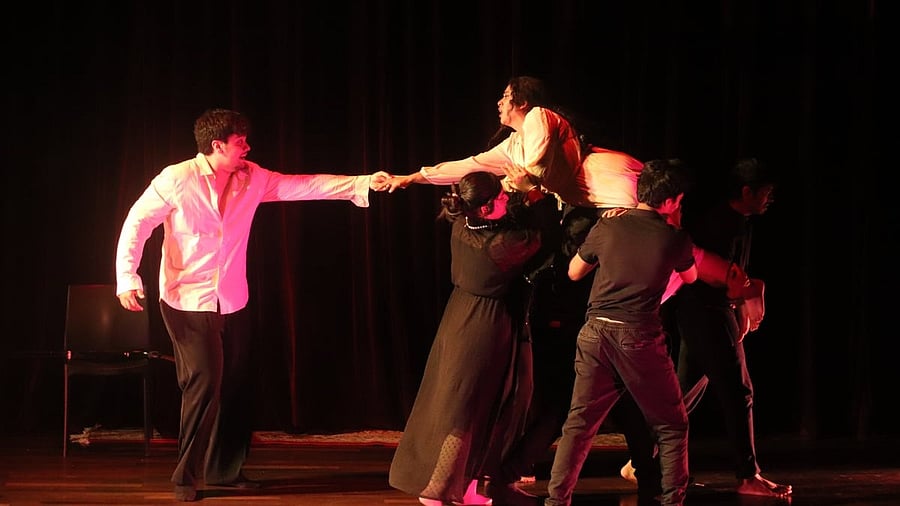
It is no facile task to stage a 128-year-old Russian play and make it relevant to audiences in Bengaluru.
But the city’s Arena Theatre Productions has been staging some challenging plays. It has dared to bring to life Anton Chekhov’s classic, ‘The Seagull’ at the Bangalore International Centre last week.
‘The Seagull’, Chekhov’s first major play premiered in Saint Petersburg in 1896 to a largely hostile response and it was only two years later when it was staged in Moscow that it achieved success. Subsequently, the play has been staged in many countries.
“As a lover of Chekhov’s work, I could relate to this play. The topic is relevant even today — the struggles of writing, getting recognition, the love triangle, mental health and help,” actor-director Tahera told Showtime. “I wanted to get these messages out.”
‘The Seagull’ is a slice-of-life drama taking place in a Russian countryside estate in the late 1800s. Set in four acts with an 11-person ensemble, it dramatises the artistic and romantic conflicts between the characters.
The opening lines set the tone for the rest of the play when Medvedenko, a school teacher asks his lover Masha: “Why is it you always wear black?” and Masha responds: “I’m in mourning for my life. I’m unhappy.”
The play begins with the characters assembling at the estate to see a play written by Constantine (Syed Saad) who has cast Nina Zarina (Tahera) to impress his actress mother Irina Arkadina (Rupali Krishnan) and also to win Nina’s affection. Envious of Nina’s beauty and promising career, Irina derides her son’s new play, terming it “decadent rubbish” and holding back her appreciation which he is desperately seeking. The play flops.
Meanwhile, Nina has fallen for Boris Trigorin (Gautam P B), a successful writer and Irina’s lover. A heartbroken Constantine kills a Seagull and shows it to Nina, to symbolise the destructive force of his unrequited love for her. Add to the mix, the estate overseer Shamraeff (Harsh Sheokand), his wife Polina (Swastika Dasgupta) and their daughter Masha (Saakshi Sahu) who is in love with Constantine despite being attached to Medvedenko (Shivam Rao), a teacher.
Everyone seems to be in love with someone who is in love with someone else. They all go their separate ways but few months later reunite at the same estate as more drama unfolds.
The production hasn’t been completely faithful to Chekhov’s play. Although Syed Saad adapted it to 1950s Russia with some dialogues paraphrased to break the heavy monotony and incorporating dance and music, it captured the essence of Chekhov’s drama.
As one of the main characters, Constantine struggles to find focus and insight as a writer but Saad excelled on stage with his composed performance bringing force when required. Tahera, as the idealistic and fame-hungry Nina, essayed her role with confidence and maturity especially in emotionally-charged scenes. Rupali as the middle-aged actress Irina, obsessed with fame and beauty, was impressive with her poise and glamour. Prithvi Raj as Peter Sorin the estate owner, Gautam as Trigorin the reputed writer and Subharthi Kundu as Eugene Dorn, the country doctor impressed with their natural performances.
Tahera’s direction saw scenes flowing quickly and neatly. The colourful sets and period furniture provided rich visual imagery, supporting the theme of the play. The costumes however lacked historical authenticity. Despite the lack of mics, the dialogues were audible, occasionally drowned in the loud background music.
This amateur theatre group of Bengaluru deserves credit for tackling a play that’s not so much plot-driven, but about character studies. What’s equally laudable is the effort to pick a classic with universal themes that are relevant today — writing, love, heartbreak, lost opportunities, generational clash.
As we were leaving, I heard a member of the audience say “Nothing like the old classics, I hope they stage more.” I nodded.
Clearly, theatre lovers seem to be thirsting for more such plays.